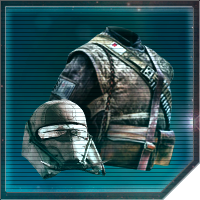P: Wanderer's Travel Garb

P: Wanderer's Travel Garb
(Wanderer's Travel Garb)
Type:
Armor
Category:
Light Armor
Armor Cosmetic: Urban Camo
Armor Enhancement - III: Optical Camouflage System (Basic)
Armor Enhancement - II: Ready Harness
Armor Light Resistance Upgrade - I: Armorweave Construction
Armor Helmet Upgrade - III: Defense Alert System (Advanced)
11,340
Owned by: Diyrian "Diy" Grivna
Prototype: Wanderer's Travel Garb
Slotted in: Paum's stuff
The Wanderer’s Travel Garb is a set of practical gear generally worn by those who often find themselves in harsh and unforgiving environments. It consists of various layers of fabrics, hide, and patchwork armorweave segments, with comfortable banded boots, and is capable of protecting the individual from the elements and providing minimal protection. It comes with an enclosed helmet with a polarized visor and an air filtration system
P: Wanderer's Travel Garb has been designed with an urban scheme camouflage. Each component of the armor has been applied with a mingled pattern of gray tones to better blend with an urban environment.
P: Wanderer's Travel Garb has been fitted with an experimental optical camouflage generation system, allowing this Wanderer's Travel Garb to hide from the naked eye and visual sensors by being rendered invisible. To maintain this, the user of Wanderer's Travel Garb must remain completely still.
The chest of this Wanderer's Travel Garb has been fitted with a ready harness, allowing equipment to be more easily accessible and its weight more comfortably distributed around the armor on the wearer's frame through a series of hooks, straps, and clips.
P: Wanderer's Travel Garb has been constructed using a lightweight armorweave, providing it with a little additional protection against a variety of attacks when compared to standard Wanderer's Travel Garbs.
The helmet of this Wanderer's Travel Garb has been fitted with a defense alert system using a droid brain chip and various sensors, alerting the wearer to incoming fire on this Wanderer's Travel Garb from a specific direction.